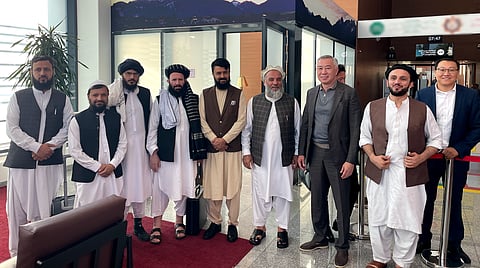

Kazakhstan and Afghanistan are set to upgrade their diplomatic relations, with Astana agreeing to accept an ambassador appointed by the Taliban-led government in Kabul.
The announcement came Saturday during a visit to Kabul by Kazakhstan’s Foreign Minister Murat Nurtleu, who met with Afghan Acting Foreign Minister Amir Khan Muttaqi. According to Zia Ahmed, Director of Public Communication at Afghanistan’s Foreign Ministry, the move is “viewed as a significant signal of renewed political engagement between the two countries.”
Kazakhstan becomes the sixth country to fully normalize diplomatic ties with the Taliban-ruled Islamic Emirate of Afghanistan (IEA), following China, Uzbekistan, the United Arab Emirates, Russia, and Pakistan.
Formal diplomatic engagement between Kazakhstan and the IEA began in April 2023, when the Kazakh government transferred the Afghan embassy in Astana to Taliban control. In December of that year, Kazakhstan removed the Taliban from its list of banned organizations and subsequently accepted a chargé d'affaires to head the mission.
Since then, economic ties between the two nations have grown significantly, with annual trade now surpassing $1 billion. The countries have also held an annual Kazakh-Afghan Business Forum to deepen commercial cooperation.
On Thursday, a key agreement was signed for Kazakhstan to invest $500 million in Afghanistan’s Herat-Torghundi railway project, a major component of the proposed Trans-Afghan Corridor. The corridor is envisioned as a strategic trade route linking Central, South, and West Asia.
The IEA has made recognition a core foreign policy goal since returning to power in August 2021. With Kabul still lacking control of many of its former embassies abroad and under continued sanctions and trade restrictions from the West, the Taliban has sought regional partnerships to break out of international isolation.
Earlier this month, the Taliban achieved a diplomatic breakthrough when Russia became the first major country to officially recognize the IEA, a move expected to accelerate regional efforts toward normalization.